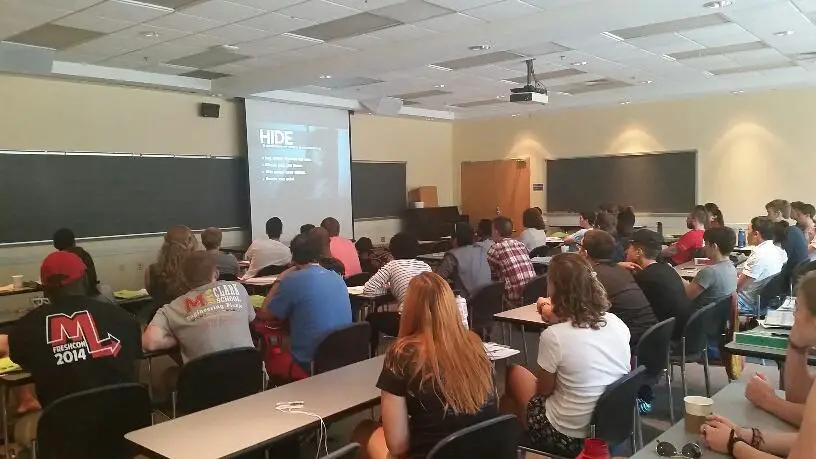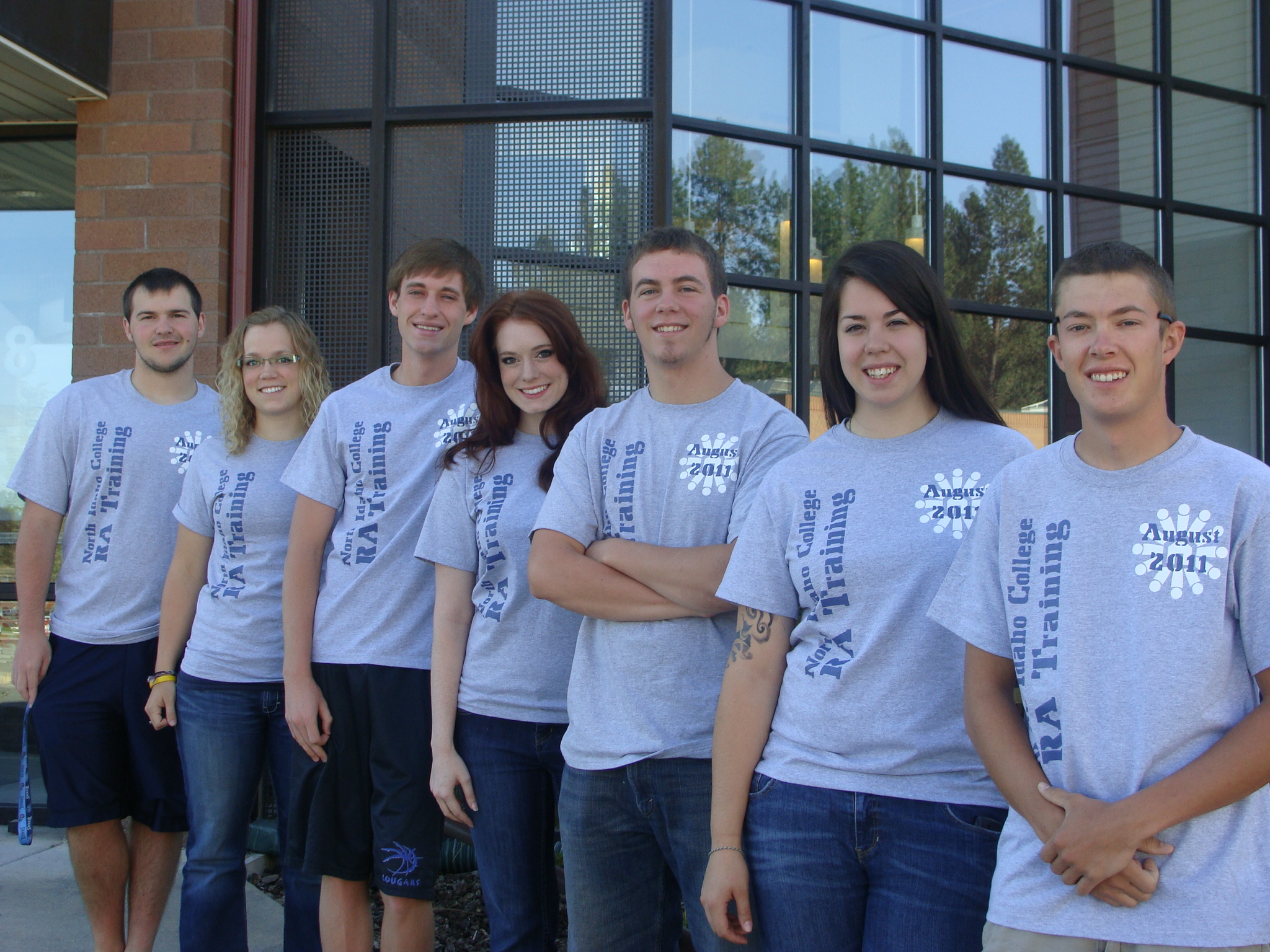Contrary to popular belief, the role of a resident assistant includes more than creating cute door decorations and planning pizza parties. As a former RA, I have firsthand accounts of the zany ordeals that unfold in dorm hallways, and have heard stories of daunting scenarios encountered by fellow RAs. The job is demanding and requires being ready for anything (literally—anything), but it comes with its joys and rewards.
Before being given the title of resident assistant, an extensive amount of training is required. Everything from school policy to sustainability efforts are covered in training, with a special focus on things like fire safety, mediating roommate conflict and how to handle various conduct violations. Other established programs, such as QPR Suicide Awareness and Response training, TIPS Alcohol Safety training and Intergroup Dialogue sessions, are also incorporated. In addition to the two-week initial training, monthly in-service meetings and another week of sessions at the beginning of spring semester keep everyone up to speed on their policy and prepared for whatever sticky situations they may find themselves in.

After training, responsibilities are assumed upon move-in day and are to be met throughout the frenzy of the school year. Most importantly, RAs serve as community builders in the residence halls. Their number-one priority is creating a safe, cohesive environment where all students can comfortably live and, hopefully, have a little fun too. Being in tune with student needs and feelings is the key to planning effective programs that students want to attend. Programming is a large chunk of where the work happens, especially for RAs in freshman halls. Providing abundant opportunities for younger undergrads to meet their hall-mates allows them to make friends. It also fosters diversity in social belonging, so that everyone has something to be a part of and identify with. Cue movie nights and bagel brunches!
Not only do RAs provide snacks and Band-Aids; they can provide information about almost anything on campus. During training, they are introduced to a variety of campus partners and services available to students. In essence, they know who on campus can help you with what, where they’re located and how to get in touch with them. Need your resume looked over? Ask your RA for Career Service’s number. Wondering how to find healthy food in the dining hall without eating only salad? Ask your RA; they’ll know where to find the campus nutritionist. They are like the master campus contacts list you’ve been meaning to compile but haven’t had the time to, and probably don’t really want to.
Of course, RAs are also in charge of communicating policy expectations to students and making sure they’re followed, but realistically, they don’t have much power in enacting punishment for violations. The RA is more of a reporter than a police officer. RAs document policy infringements (like the raging pre-games that happen down the hall like clockwork on Thursdays, or the dog your neighbor has been hiding for two months), and then it’s out of their hands. Remember, RAs are not trying to bust students or be buzzkills. They are supposed to maintain safe, healthy dorms. What’s more, the paperwork that gets dumped on them when they submit a write-up is plenty of incentive not to report things for goofs and giggles.
RAs aren’t just expected to keep an eye on student conduct. They are also expected to uphold policy themselves at all times. They can be put on probation or fired if they’re caught in a situation where a policy violation is in action or if they’re personally breaking the rules, as they must be capable of handling a situation anytime the phone rings, whether it’s the weekend or not.
Though the on-call schedule rotates, RAs must come to the rescue when a resident is in need, regardless of the day or time. Balancing school, social time, the tasks of living independently, plus the wellbeing and livelihood of fifty-two other students with the same load is a tremendous feat. If you do see your RA out at a party busting moves instead of students, give them a high-five—they deserve a night off once in a while.
Keeping an eye on a building or floor and all of the students who inhabit it is not for the faint of heart. Sometimes, the job requires calling the facilities department at 8 a.m. on a Sunday because a student frantically burst into your room as a result of a squirrel breaking into theirs. Other times, it entails scheduling a sit-down to mediate between the frenemies who are always fighting on the second floor.
Discovering and putting in work orders for the cleanup of strange bodily fluids in obscure places is a regular task, be it vomit in the washing machine or someone using the hallway floor for business only meant for a bathroom (these things really happen, and they are not cute). People scribble profanities on posters, steal furniture from student lounges and throw glass beer growlers out the window so they shatter on the sidewalk, and it is the indefatigable RA who picks up the pieces (in some cases, literally) and keeps the building standing.
Yet, while managing wacky mishaps is a substantial part of the job, RAs are also trained to be on the front lines when faced with more serious scenarios, like sexual assaults, domestic violence, suicidal students and bullying. They are the ones who concerned roommates call when their friend won’t get out of bed and grows despondent. They’re the ones who knock on the door someone heard yelling and slamming behind. They are the ones who are allies to everyone and have their doors open to listen, assist and empathize with ostracized individuals and survivors of sexual violence alike.
Whether it’s a flood or grief from the sudden death of fellow classmates that ravages a residence hall, RAs are there ensuring the safety and stability of their residents. Often, when fear strikes (like when an active shooter alert is issued and there is no school protocol for such an event) RAs can be seen going above and beyond their job descriptions to protect students’ happiness and, at times, their lives. The serious and daunting situations are luckily far and few between, but they do happen and RAs are trained to be prepared to handle them. As with anything else, great responsibility comes with great reward; RA life is no exception.
They have the opportunity to build one-of-a-kind relationships with residents and gain fellow-RA friends they can count on. Seeing residents be successful and happy is the most rewarding part of the job, and gaining incredible friends is a close second. Perks like a single dorm room (that may or may not be almost twice the size of other rooms) or being treated to dinner downtown by the Reslife bosses aren’t too shabby, either! Also, creating a kick-butt display for gluts of condoms and lube (hooray safe sex!) is oodles of fun, period.
Being an RA certainly has its benefits and its ugly moments, but it is certainly an unforgettable experience, mostly because your RA pals will never let you forget the time someone broke the sink in the bathroom by sitting in it, or the other time someone was running around naked, holding pumpkins and playing ding-dong-I’m-drunk-and-nude-ditch. Yikes. For a resident assistant, Reslife is life, and it’s nothing short of interesting!










